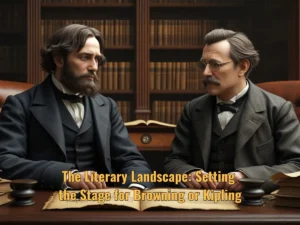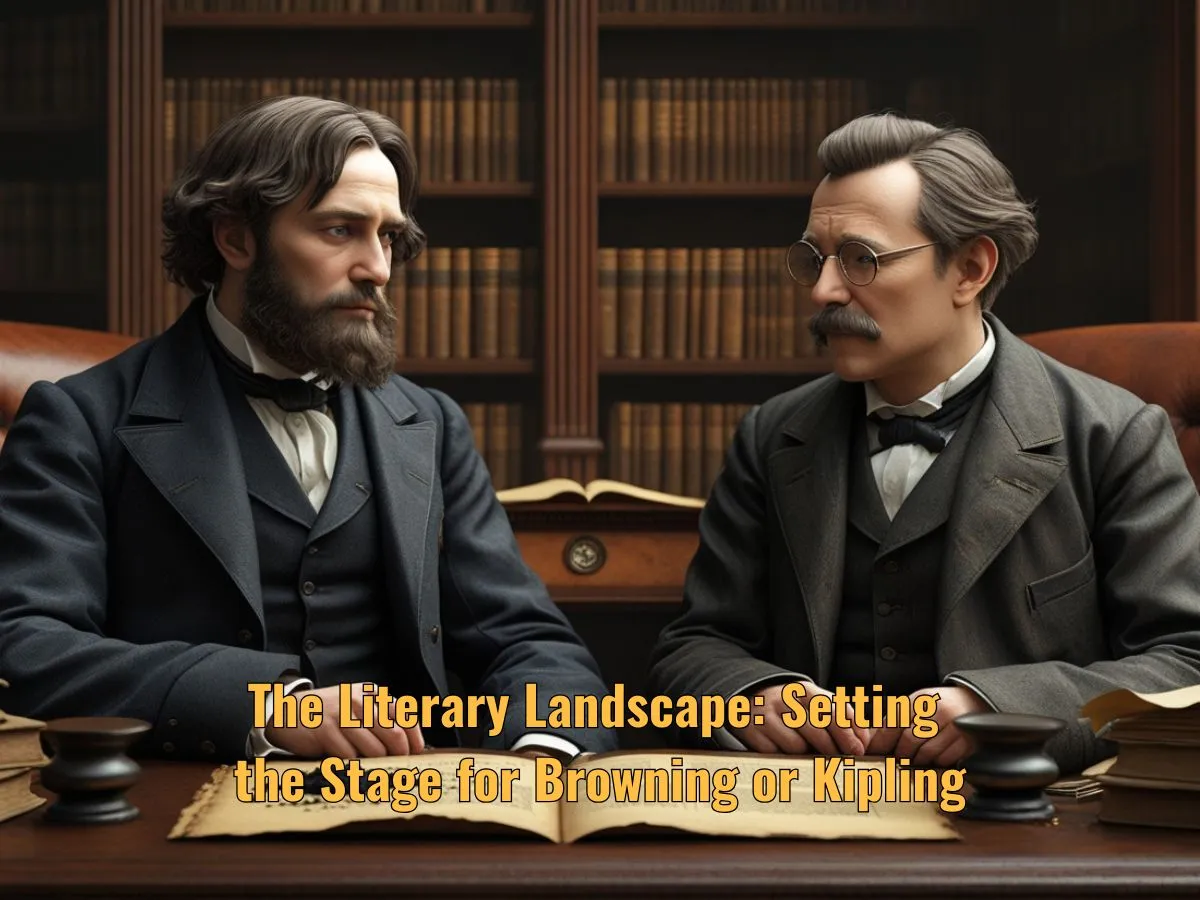Introduction
Few debates in literary history are as exciting as Browning Or Kipling. From conflicting literary perspectives, both figures are poetic giants in their own right. Robert Browning is remembered among Victorian poets for his dramatic monologues and psychological depth; Rudyard Kipling became famous for his storytelling, themes of empire, and a unique narrative voice.
A choice between Browning Or Kipling becomes very difficult since it is not one of individual taste but also what kind of literature speaks to modern-day readers. Let us examine the ways these two differ and what makes each one still relevant today.
Literary Style and Language
Robert Browning’s works are often characterized by complexities in language and meanings. The dramatic monologue gave Browning’s characters the power to speak directly to the audience, often revealing more than they intended.
Poems like “My Last Duchess” and “Porphyria’s Lover” show his way with psychological nuance and tension. A difficult read, the poems reward careful reading by the emotional depth and heroism of his thought.
Rudyard Kipling was more direct – and so equally strong. His works were marked by rhythmic and clear accessibility. Whether in poetry or prose, Kipling was a master storyteller.
If The Jungle-Book; and Gunga Din; the works reveal his talent for rhythm, structure, and emotional force. So on choice between Browning Or Kipling, the question arises: do we value inner depth more, or do we value the clarity of tall tales?

Themes and Messages
Themes are central to the Browning Or Kipling debate. Browning’s early work often treated some internal conflict, moral ambiguity, and personal transformation. He examined the intricacies of human behavior, leaving his readers to decide. His work is philosophical and requires readers who are reflective and open to several layers of interpretation.
On the other hand, Kipling tackled themes of the empire, duty, identity, and childhood. He has been criticized for his imperialist attitudes in some of his work, but he has also imparted lessons of resilience, character, and morality.
His poem If– one of the most quoted poems in the English language, is highly esteemed for its lessons of integrity and perseverance.
Choosing Browning Or Kipling ultimately comes down to which themes resonate with readers more. Browning invites reflection on self, while Kipling often extends a clear moral or lesson.
Cultural Impact and Legacy
Both writers have left significant marks upon literature and culture. Browning was an innovator in poetic form and gave inspiration to generations of poets and playwrights.
His insight into the psychology of human behavior and his innovatory structures influenced subsequent modernist writers.
Kipling has had a more immediate, worldwide impact upon culture. His stories have become a part of childhood for millions of people, adapted into films and school curricula.
Today, however, much of his reputation is tainted by the colonial views expressed in some of his writings. Nevertheless, even those who disagree with these views consider his storytelling and poetic art to be of high value.
In comparing Browning Or Kipling, it is important to view legacy not merely through the lens of reputation but also through the vector of how their ways have shaped contemporary thinking and creativity.
Browning shaped the form and tone of poetry, while Kipling would for more than a century be shaping stories told from culture to culture.
Which Writer Speaks to Modern Readers?
Modern readers look for relevance, emotional connection, and meaning. In the Browning Or Kipling debate, the two authors still hold auditory weight, yet in very different fashions. Kipling appeals to those who love structure, narrative, and motivation. His poems, such as If– and The Law of the Jungle, teach lessons on courage and discipline. Some of these themes certainly belong to a different time, but very many of his messages are timeless.
In the classroom, Browning is frequently introduced for his technical prowess, while Kipling finds his way into discussion through narrative strength and polarizing ideological agenda. Whether one favors Browning Or Kipling often hinges on personal value system and what one seeks to attain from literature.
Conclusion
So the question of Browning Or Kipling is simply not whether you declare one a winner, but celebrating two tremendously opposing voices within English literature. Browning contains depth, and complexity and serves as a mirror into the human soul; Kipling offers clarity, structure, and the magic of the storyteller. Both have distinct and enduringly influential marks drawn onto the canvas of literature.
Even then, it would largely remain dependent on personal taste, the disposition of the reader, and the context under which the works are read when it would come to Browning Or Kipling. Whether psychological insight from the works of Browning or the engaging stories and precious verses of Kipling; both those are worthy treasure troves of inspiration.
So the next time someone poses the question Browning Or Kipling, think not just about which name sounds more familiar, but which voice speaks more clearly to your own experience and understanding of the world.
